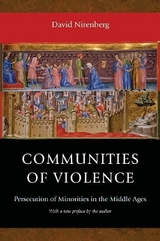
Communities of Violence
Persecution of Minorities in the Middle Ages
Seiten
1996
Princeton University Press (Verlag)
978-0-691-03375-4 (ISBN)
Princeton University Press (Verlag)
978-0-691-03375-4 (ISBN)
- Titel erscheint in neuer Auflage
- Artikel merken
Zu diesem Artikel existiert eine Nachauflage
This work is concerned with violence against minorities in 14th-century France and the Crown of Aragon. It aims to show that the use of violence could be manipulative, and often expressed complex beliefs about topics as diverse as divine history, kingship, sex, money and disease.
In the wake of modern genocide, we tend to think of violence against minorities as a sign of intolerance, or, even worse, a prelude to extermination. Violence in the Middle Ages, however, functioned differently, according to David Nirenberg. In this provocative book, he focuses on specific attacks against minorities in 14th-century France and the Crown of Aragon (Aragon, Catalonia, and Valencia). He argues that these attacks - ranging from massacres to verbal assaults against Jews, Muslims, lepers, and prostitutes - were often perpetrated not by irrational masses labouring under inherited ideologies and prejudices, but by groups that manipulated and reshaped the available discourses on minorities. Nirenberg shows that their use of violence expressed complex beliefs about topics as diverse as divine history, kingship, sex, money, and disease, and that their actions were frequently contested by competing groups within their own society.
Nirenberg's readings of archival and literary sources demonstrate how violence set the terms and limits of co-existence is underscored by the book's juxtapositions - some systematic (for example, that of the Crown of Aragon with France, Jew with Muslim, medieval with modern), and some suggestive (such as African ritual rebellion with Catalan riots). Throughout, the book questions the applicability of dichotomies like tolerance versus intolerance to the Middle Ages, and suggests the limitations of those analyses that look for the origins of modern European persecutory violence in the medieval past.
In the wake of modern genocide, we tend to think of violence against minorities as a sign of intolerance, or, even worse, a prelude to extermination. Violence in the Middle Ages, however, functioned differently, according to David Nirenberg. In this provocative book, he focuses on specific attacks against minorities in 14th-century France and the Crown of Aragon (Aragon, Catalonia, and Valencia). He argues that these attacks - ranging from massacres to verbal assaults against Jews, Muslims, lepers, and prostitutes - were often perpetrated not by irrational masses labouring under inherited ideologies and prejudices, but by groups that manipulated and reshaped the available discourses on minorities. Nirenberg shows that their use of violence expressed complex beliefs about topics as diverse as divine history, kingship, sex, money, and disease, and that their actions were frequently contested by competing groups within their own society.
Nirenberg's readings of archival and literary sources demonstrate how violence set the terms and limits of co-existence is underscored by the book's juxtapositions - some systematic (for example, that of the Crown of Aragon with France, Jew with Muslim, medieval with modern), and some suggestive (such as African ritual rebellion with Catalan riots). Throughout, the book questions the applicability of dichotomies like tolerance versus intolerance to the Middle Ages, and suggests the limitations of those analyses that look for the origins of modern European persecutory violence in the medieval past.
David Nirenberg is Associate Professor of History and Director of the Center for the Study of Cultures at Rice University.
| Zusatzinfo | 2 Maps |
|---|---|
| Verlagsort | New Jersey |
| Sprache | englisch |
| Maße | 152 x 229 mm |
| Gewicht | 680 g |
| Themenwelt | Geschichte ► Allgemeine Geschichte ► Mittelalter |
| Geisteswissenschaften ► Geschichte ► Regional- / Ländergeschichte | |
| Geschichte ► Teilgebiete der Geschichte ► Kulturgeschichte | |
| Sozialwissenschaften ► Ethnologie | |
| Sozialwissenschaften ► Soziologie | |
| ISBN-10 | 0-691-03375-7 / 0691033757 |
| ISBN-13 | 978-0-691-03375-4 / 9780691033754 |
| Zustand | Neuware |
| Informationen gemäß Produktsicherheitsverordnung (GPSR) | |
| Haben Sie eine Frage zum Produkt? |
Mehr entdecken
aus dem Bereich
aus dem Bereich
eine neue Geschichte des Mittelalters
Buch | Hardcover (2023)
C.H.Beck (Verlag)
38,00 €
Geschichte einer Augsburger Familie (1367-1650)
Buch | Softcover (2024)
Kohlhammer (Verlag)
34,00 €



